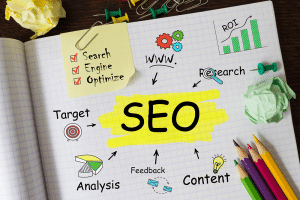When was the last time you checked your website’s load speed?
Last week, last month…never?
Your website’s load speed, which is the time it takes for your website to fully load when someone clicks on your URL, link, etc., is extremely important.
Why?
Because people are impatient—very impatient! Which means they won’t wait more than two seconds before they click off and try another website that does load more quickly.
Think about the last time you visited a slow loading webpage. How long did you wait before clicking off and going to another website?
EXACTLY!
Why Is Website Load Time Is So Important?
As a Web Design Agency and SEO Agency, we have found a website’s load time is important because if your site doesn’t load in two seconds or less, you will encounter fewer page views, unfavorable customer satisfaction, a loss in conversions, your ability to engage with your customers to make bigger sales, and so much more.
So you have to ask yourself… Is that fancy design, great new plugin, all of those tags, or some new functionality you’ve discovered really worth it?
How Does Website Speed Affect Conversions?
The speed your website loads will directly affect your conversions. If it loads slow, you will lose customers (and potential customers), and most of them will never return. And, those same customers you just lost due to a slow loading webpage will tell someone else about it.
Did you know that 47% of website visitors expect a webpage to load in two seconds or less and that 40% them will abandon a site that takes more than three seconds to load?
Yep! And those are some sobering statistics!
Just imagine what that’s doing to your conversions.
Does Website Speed Affect Your SEO?
YES! One of Google’s main ranking factors is a website’s load time. Especially now that Google has implemented their mobile-first indexing policy late last year.
What does that mean for you?
Well, that means if your website has a slow load time, Google, and probably the other search engines as well, won’t rank your website very highly; therefore, it won’t be found by as many people as it would if it had a better ranking.
Additionally, with the new mobile-first indexing firmly in place, Google now uses your website’s mobile URL for ranking purposes. So if you aren’t giving your mobile visitors a good user experience, your website probably won’t be indexed and ranked very highly, if at all.
What Is Considered a Good Website Load Time?
A good website or webpage load time is less than two seconds. Yes, that seems like an extremely short amount of time, and it is unless you are browsing the internet where everything takes place at lightning speed and most people expect immediate results.
In fact, as a web page’s load time increases from one to ten seconds, the likelihood that the mobile user will bounce also increases at a probability of 123%.
Yikes!
However, if your webpage loads in under three seconds, the bounce rate is reduced to below 32%.
So how can you increase your website speed?
Keep reading…
Three Quick Ways to Increase Your Website’s Speed
#1 Caching Plugins
Using cache plugins will enable browser caching, which will improve your website’s load time significantly. Caching stores static files such as HTML text, media files, images, CSS and other files like JavaScript and makes them easier to access which speeds up your site’s load time.
Every website platform will have different ways of enabling the browser cache option. If you are using WordPress, the WP Rocket, W3 Total Cache and WP Super Cache are a few of the most popular plugins for this purpose. Notice, we said WordPress. If you are using a hosted CMS platform like Wix, Weebly, Squarespace, etc. You do have this option.
#2 Image Compression
Images take up a significant amount of bandwidth. Therefore, you should always optimize your images so they don’t slow down your website’s load time. Optimizing your images is relatively easy with a plugin that’s designed to reduce image sizes without affecting their quality.
Each website platform will have different ways of optimizing images. However, if you use WordPress, WP Smush is one to consider. And if you use Drupal or Joomla you could consider Kraken.
#3 Quality Hosting Service
Most people don’t realize that their hosting service can have a huge effect on how fast their website loads because of the time it takes that service to look up your DNS. Your DNS (domain name system) is a server with a huge database of IP addresses and the hostnames they are associated with. So, if your hosting service isn’t as fast as some of the other available hosting service providers, this could ultimately affect your load times, which, in turn, will affect your rankings, conversions, and visibility.
How Do I Test My Website’s Load Time?
You can use Google’s free tool for testing your website’s load time. That tool is called PageSpeed Insights and all you have to do is enter your URL and the tool will analyze your content and give you suggestions for making your webpage faster.
What’s Next?
If you would like more information about how to increase your website load time, please Contact Us today.
There are many more things you can do to increase the load time of your website. We have a team of experts who know exactly how to do just that and can help take your website to the next level and beyond.
We look forward to assisting you in any way we can!




